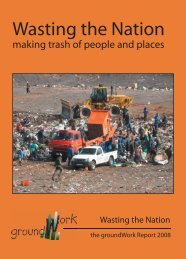Retreaded Tires Case - The Center for International Environmental ...
Retreaded Tires Case - The Center for International Environmental ...
Retreaded Tires Case - The Center for International Environmental ...
- No tags were found...
Create successful ePaper yourself
Turn your PDF publications into a flip-book with our unique Google optimized e-Paper software.
<strong>The</strong> Brazil - <strong>Retreaded</strong> <strong>Tires</strong> <strong>Case</strong>waste tires; (e) to discipline the use of waste tires co-processingtechnologies in cement production; and (f) to controlemissions in industrial plants co-processing waste tires. 6<strong>The</strong> European Union is also dealing with the environmentalrisks associated with waste tires disposed of in landfills. Inorder to deal with its waste tire stream, the EC adopted threeDirectives:(1) the Landfill Directive (1993/31/EC), which restrictsand ultimately prohibits the disposal of used tires in EClandfills—as of 2006, whole, cut or shredded tires arecompletely banned from landfills within the EuropeanCommunity, leading to an important increase of tires tobe disposed of in another manner;(2) the End of Life Vehicle Directive (2000/53/EC), whichestablishes percentages and sets deadlines <strong>for</strong> ECMember States to reuse or recover tire waste—morespecifically, this Directive requires Members States toensure that the reuse or recovery rate <strong>for</strong> waste tiresrises to 85% by January 2006, and further increases to atleast 95% by January 2015; and(3) the Waste Incineration Directive (2000/76/EC), whichestablishes emission limit standards <strong>for</strong> plants incineratingtire waste within the Community. As a result of itsdesire to avoid disposal expenses that would be higherbecause of its stricter environmental regulations, the EUis looking to find alternative ways of dealing with the millionsof used tires that it produces and uses annually. 7In the pending WTO dispute, Brazil has raised the concernthat the EC intends to dispose of its used and retreaded tiresby exporting them abroad. In its statement to the WTO’sCommittee on Trade and Environment on 6 July 2005,Brazil noted:Another obvious consequence of the implementation of thementioned Community Directives will be an increasing pressure<strong>for</strong> new markets <strong>for</strong> the EC’s used and retreaded tires.Consumers all over the world have a very strong perceptionthat used tires are trash and that retreaded tires are low qualityproducts. European consumers clearly prefer new tires toshorter lifespan products (retreaded tires) or wastes (usedtires). <strong>The</strong>re<strong>for</strong>e, the EC will need to search <strong>for</strong> consumers ofthese products outside its borders.By exporting retreaded tires to Brazil, the EC would eliminateused tires from its territory, and also transfer theresponsibility <strong>for</strong> the end use of waste tires to the receivingcountry (in this case, Brazil). If Brazil is unable to manage itstire waste in an environmentally sound and sustainable mannerthat would avoid contamination with hazardous pollutantsand proliferation of diseases in its territory, then Brazilarguably has the right to ban the importation of recycled tiresthat would compound these problems on environmental andhealth grounds. In that vein, whether retreaded tires aggravatethe environmental and public health impacts of tirewaste in Brazil may call <strong>for</strong> careful analysis of several issuesof fact, such as, inter alia: tire disposal requirements andcapacity in Brazil and life-span of domestic tires.Some of the issues involved in trade in used tires and tirewaste are addressed by the Basel Convention onTransboundary Movements of Hazardous Wastes and <strong>The</strong>irDisposal (Basel Convention), examined next.Transboundary Movement of Waste as a ProblemRecognized in the Basel Convention<strong>The</strong> Basel Convention was adopted in 1989 as a response toincreased exports of hazardous waste from industrializedcountries to developing countries and Eastern Europe.Ratified currently by 167 countries, the key objectives of theBasel Convention are: to minimize the generation of hazardouswastes in terms of quantity and hazardousness; todispose of hazardous waste in an environmentally soundmanner; to ensure national self-sufficiency in hazardouswaste management, and to reduce the transboundary movementof hazardous wastes.To achieve these objectives, the Basel Convention hasestablished several rights and obligations. Among these isthe sovereign right of any country to first declare a waste ashazardous and subject to control. 8 Parties exercising theirright to prohibit the import of hazardous or other wastes(defined as wastes collected from households and incineratorash) must in<strong>for</strong>m the other Parties. Parties are thenobliged to not permit the export of hazardous wastes or otherwastes to the Parties that have prohibited the import of suchwaste. 9 Further the Convention <strong>for</strong>bids the export of wasteto countries lacking the ability to manage such waste in anenvironmentally sound manner. 10 <strong>The</strong> Convention also calls<strong>for</strong> every party to ensure the availability of adequate disposalfacilities <strong>for</strong> the environmentally sound management ofhazardous and other wastes, that shall be located to theextent possible in the state where the waste was generated. 112 March 2006
















